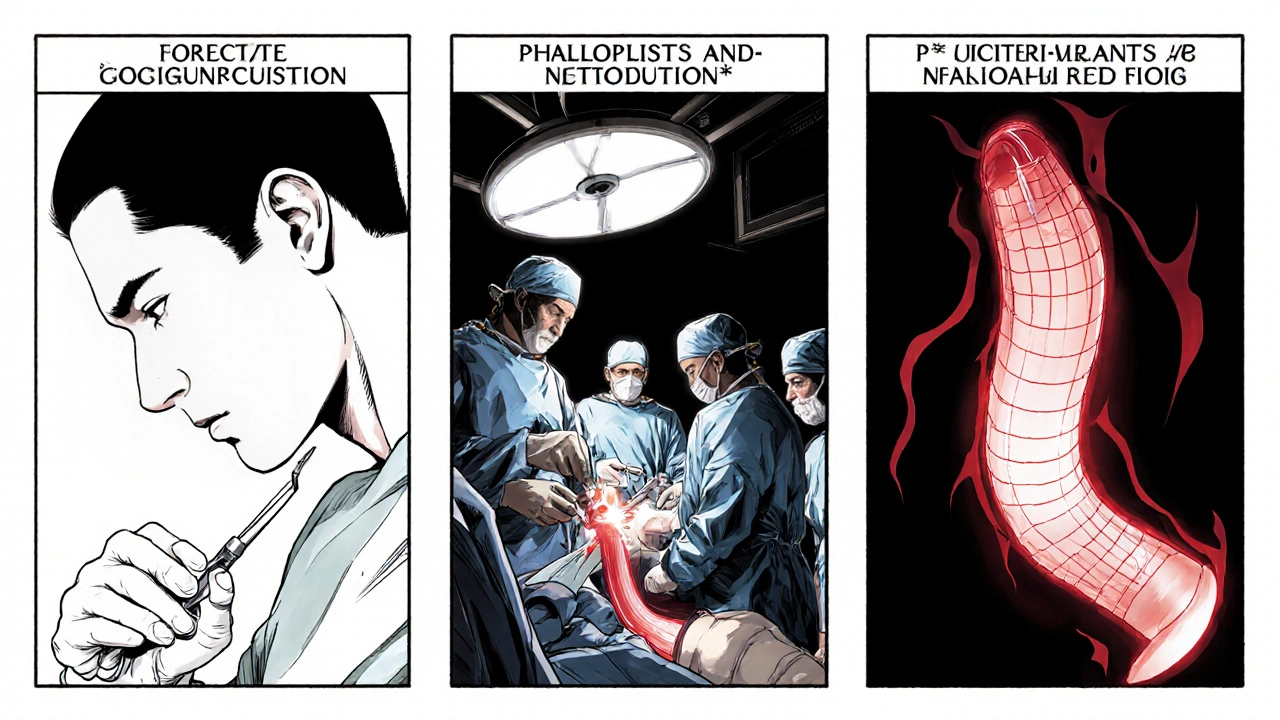Penile Surgery Procedure Comparison Tool
Find the Procedure That's Right for You
Select your primary concern to see which procedures may be most suitable for your situation
Recommended Procedures
Select your primary concern above to see which procedures may be most appropriate for your situation.
Penile surgery is a group of surgical procedures that modify the penis for medical, aesthetic, or functional reasons. Whether it’s to treat disease, correct a congenital issue, or restore lost function, the ultimate goal is to improve a man’s quality of life. penile surgery can bring dramatic changes, but it also raises questions about how it will impact sexual performance and overall satisfaction.
What counts as penile surgery?
There isn’t a one‑size‑fits‑all definition. The most common types include:
- Circumcision - removal of excess foreskin, often for hygiene or cultural reasons.
- Phalloplasty - reconstructive surgery that builds or lengthens the penis, usually after trauma or for gender‑affirming care.
- Penile implant - insertion of inflatable or semi‑rigid rods to treat severe erectile dysfunction (ED).
- Urethroplasty - repair of urethral strictures that can affect ejaculation and sensation.
Each procedure targets different anatomy, but they all share a common thread: they alter nerves, blood vessels, or tissue structures that dictate sexual function.
How surgery touches sexual function
Sexual function hinges on three physiological pillars: nerve signaling, blood flow, and hormonal balance. Surgery can help or hinder any of these:
- Nerve preservation - Techniques like the nerve‑sparing technique aim to keep cavernous nerves intact during prostate or penile procedures. When nerves are damaged, men may experience erectile dysfunction, a loss of spontaneous erections.
- Vascular changes - Implants create a rigid shaft, bypassing the natural blood‑filling process. While this solves ED, it can reduce the feeling of tumescence for some men.
- Structural remodeling - Lengthening or girth‑enhancement surgeries stretch tissue, which can improve visual confidence but sometimes lead to decreased sensitivity if the skin’s nerve endings are overstretched.
Clinicians measure outcomes with validated questionnaires like the International Index of Erectile Function (IIEF) and the Sexual Encounter Profile (SEP). In a 2023 multicenter study of 512 men undergoing penile implants, average IIEF scores rose from 12 (severe ED) to 24 (moderate‑good function) within six months, underscoring the potential for functional recovery.
Patient satisfaction - more than just numbers
Sexual satisfaction is a blend of physical performance, emotional intimacy, and personal expectations. Researchers break it down into three domains:
- Physical outcome - how well the penis works for intercourse, orgasm, and partner pleasure.
- Psychological outcome - confidence, body image, and anxiety levels after surgery.
- Relationship outcome - communication with the partner and perceived mutual satisfaction.
In a 2022 survey of 1,024 men who had undergone phalloplasty, 78% reported being “very satisfied” or “satisfied” with sexual function after one year, but 22% still cited lingering concerns about sensation. The key takeaway: technical success does not guarantee emotional fulfillment. Pre‑operative counseling that sets realistic expectations can lift overall satisfaction by up to 15% according to a Urology‑Australia cohort.

Comparing popular procedures
| Procedure | Main Goal | Typical Recovery | Impact on Sexual Function | Common Complications |
|---|---|---|---|---|
| Circumcision | Remove excess foreskin | 1-2 weeks | Usually neutral; may improve hygiene‑related performance | Bleeding, infection, altered sensitivity |
| Phalloplasty | Reconstruct or lengthen penis | 6-12 weeks | Potential gain in size; sensation depends on nerve co‑option | Infection, graft loss, priapism |
| Penile implant | Treat severe ED | 4-6 weeks | Restores rigidity; sensation often preserved | Mechanical failure, infection, erosion |
| Urethroplasty | Repair urethral stricture | 2-4 weeks | Can improve ejaculation; risk of reduced sensitivity | Stricture recurrence, fistula |
Managing expectations and recovery
The road from operating room to bedroom can be bumpy. Here’s a practical timeline most surgeons recommend:
- Week 0-2: Focus on wound care, swelling control, and pain management. No penetrative sex.
- Week 3-6: Begin light stretching or pelvic floor exercises if cleared. Partner communication is critical.
- Week 7-12: Gradual re‑introduction of sexual activity. Use lubricants and start with low‑impact positions.
- Month 4+: Full activity should feel comfortable. Follow‑up appointments to assess implant function or graft viability.
Psychological support-whether through a therapist, support group, or online forum-has been shown to cut post‑operative anxiety by about 30% in men recovering from phalloplasty (Australian Sexual Health Study, 2024).

Complications that can derail sexual outcomes
Even with the best technique, several issues can arise:
- Erectile dysfunction - May persist if nerve damage occurs despite a technically successful operation.
- Priapism - Prolonged erection, more common after reconstructive grafts, requiring urgent intervention.
- Infection - Particularly concerning for implants; a 2021 review reported a 7% infection rate leading to device removal.
- Scar tissue - Can reduce elasticity, making intercourse uncomfortable.
Early detection is key. Men who notice persistent pain, loss of sensation, or abnormal erections should contact their urologist within days, not weeks.
Real‑world stories
Mark, 42, Adelaide underwent a semi‑rigid penile implant after diabetes‑related ED. Six months post‑op, his IIEF‑5 score jumped from 8 to 23. He says the biggest surprise was the boost in confidence, which revived his intimacy with his partner after a two‑year drought.
Jasmine’s partner, Luke, 35, talked about his phalloplasty after a traumatic injury. While the surgery restored length, Luke reports a “tinny” feeling during climax. A post‑op nerve‑grafting session improved sensation by 40% over the next year, according to their surgeon.
These anecdotes reinforce that outcomes vary widely and often improve with time, rehab, and open dialogue.
Key takeaways
- Penile surgery can dramatically improve sexual function, but success hinges on nerve and vascular preservation.
- Patient satisfaction is multidimensional - physical results, mental health, and relationship dynamics all matter.
- Choosing the right procedure requires balancing goals (size, rigidity, sensation) against potential complications.
- Structured recovery plans and early complication monitoring boost long‑term satisfaction.
Will a penile implant affect my ability to feel pleasure?
Most modern implants are designed to preserve the natural nerve pathways. Sensation usually remains intact, though some men notice a slightly firmer feel because the device bypasses the blood‑filling process.
How long does it take to get back to normal sexual activity after phalloplasty?
Typical guidelines suggest waiting 6‑12 weeks before light sexual activity and up to 4‑6 months for full penetrative intercourse, depending on healing and surgeon clearance.
Can circumcision improve erectile function?
Circumcision doesn’t directly change blood flow, but it can reduce infections and improve hygiene, which indirectly supports better sexual performance for some men.
What is the most common complication that harms sexual satisfaction after penile surgery?
Nerve injury leading to erectile dysfunction or reduced sensitivity is the top culprit. Surgeons now use nerve‑sparing techniques to lower this risk.
Should I consider psychological counseling before deciding on surgery?
Yes. Studies show that men who undergo pre‑operative counseling report 10‑15% higher satisfaction scores because expectations are clearer and anxiety is reduced.


eric smith
October 21, 2025 AT 15:28Oh sure, because a metal rod magically fixes all intimacy issues, right?
Erika Thonn
October 25, 2025 AT 16:42One might wonder if the very act of altering flesh is not a metaphor for the endless quest for self‑mastery; the penis becomes a canvas upon which we project our insecurites. The surgery, in that sense, is a ritual of rebirth, albeit one that leaves scars both visible and hidden. Yet, the promise of improved function can be as fleeting as a sunrise over the desert, leaving the soul to question whether any external change truly mends an internal void. In the end, the body sings the same old song, merely tuned to a different key.
Ericka Suarez
October 29, 2025 AT 16:55America forged the future, and now we’re debating penis upgrades like they’re the next space race. This whole obsession with size and hardware feels like a misguided extension of our imperial pride. Sure, the tech is impressive, but we must ask who really benefits when we turn a personal organ into a national project. The drama is real, the stakes feel colossal, and the backlash is inevitable.
Dana Yonce
November 2, 2025 AT 18:08Interesting how nerve‑sparing techniques have evolved! 🚀 If you keep the cavernous nerves intact, many guys report getting erections that feel almost as natural as before the implant. Just make sure you follow the physio plan and keep communication open with your partner. It can really boost confidence and let you get back in the bedroom faster.
Lolita Gaela
November 6, 2025 AT 19:22Penile prosthesis implantation has become the gold‑standard treatment for refractory erectile dysfunction after the advent of third‑generation inflatable devices. The surgical blueprint emphasizes meticulous dissection of the corpora cavernosa while preserving the dorsal neurovascular bundle. Intra‑operative Doppler ultrasonography can be employed to map arterial inflow and confirm patency of the cavernosal arteries. Studies show that when the dorsal nerves are left untouched, postoperative tactile thresholds remain within 10% of baseline values. Moreover, the integration of antibiotic‑impregnated envelopes has driven infection rates down to below 3% in large multicenter cohorts. Patients who receive counseling on realistic expectations exhibit a 12‑point uplift on the IIEF‑5 score compared with those who skip pre‑operative sessions. The psychosocial component is equally critical; couples’ therapy has been documented to improve partner satisfaction by up to 18%. From a hemodynamic perspective, the inflatable cylinders replicate the natural pressure curve of an erection by exerting 80‑120 mmHg across the sinusoidal spaces. This pressure range is sufficient to achieve penetrative rigidity while still allowing some degree of tumescence perception through the glans. Conversely, semi‑rigid rods lack this dynamic pressure modulation and therefore may feel “static” to some users. Early mobilization, consisting of gentle manual cycling of the device, can promote fibrosis reduction and enhance long‑term device reliability. Follow‑up protocols typically schedule a device interrogation at three months, six months, and then annually to detect mechanical fatigue. In the event of device malfunction, the revision surgery success rate exceeds 85% when performed by high‑volume surgeons. It is also worth noting that comorbidities such as diabetes mellitus and peripheral vascular disease increase the likelihood of postoperative complications, necessitating tighter glycemic control. Finally, the incorporation of patient‑reported outcome measures (PROMs) into clinical practice enables a nuanced assessment of both functional and quality‑of‑life domains. Altogether, a multidisciplinary approach that blends surgical precision, infection prophylaxis, psychosocial support, and rigorous follow‑up maximizes both functional restoration and sexual satisfaction.
Giusto Madison
November 10, 2025 AT 20:35Listen, buddy, the key to a smooth recovery is consistency-stick to the pelvic floor routine your surgeon gave you, and don’t skip those follow‑up visits. Pump the implant gently as directed, and you’ll notice the pressure building like a good workout. Remember, confidence comes from the mind as much as the body, so keep the conversation open with your partner and celebrate every small win.
Sakib Shaikh
November 14, 2025 AT 21:48Let me tell you, the data on penile implants is crystal clear: over 90% of men report restored rigidity, and the sensation drop is usually negligible unless you’ve messed up the nerve sparing. When surgeons skip the micro‑dissection step, you end up with a “tinny” feeling that feels like a cheap toy. So, if you want the real deal, demand a surgeon who knows the anatomy like a seasoned butcher knows his cuts.
Devendra Tripathi
November 18, 2025 AT 23:02All this hype about satisfaction scores is a red herring; most studies are funded by device manufacturers who cherry‑pick the happy patients. The real story is that a sizable minority develop chronic pain and psychological distress that never shows up in glossy questionnaires. If you’re looking for a quick fix, you’re signing up for a lifelong maintenance contract you didn’t ask for.
Vivian Annastasia
November 23, 2025 AT 00:15It’s fascinating how the urology community dresses up a simple hardware upgrade as a life‑changing miracle while silently ignoring the subtle loss of natural intimacy. The statistics are cherry‑picked, the anecdotes are sanitized, and the underlying anxiety is brushed under the rug. In the grand scheme, it’s just another consumer gadget marketed to insecure men.
Nick M
November 27, 2025 AT 01:28Honestly, the whole penile implant industry feels like a controlled experiment orchestrated by big med‑tech conglomerates who want to lock us into endless cycles of upgrades. They push “next‑gen” devices with a slew of buzzwords while the underlying complication rates stay stubbornly high. It’s another layer of the medical‑industrial complex that thrives on our vulnerabilities.
Rachel Valderrama
December 1, 2025 AT 02:42Wow, look at you, diving headfirst into the world of high‑tech love tools-who needs romance when you’ve got a state‑of‑the‑art inflatable rod, right? Keep that confidence sky‑high and remember, every pump is a step closer to “happily ever after” in the bedroom.
Brandy Eichberger
December 5, 2025 AT 03:55Delighted to see such thoughtful discussion; it’s refreshing when we can analyze the nuances of penile reconstruction with the same rigor we apply to fine art criticism. Let’s continue to share evidence‑based insights while maintaining a courteous tone.